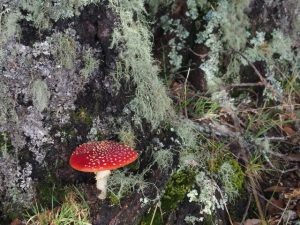Invasions and ecosystems—Ecosystem functional consequences of plant & fungal invasions, and how dynamics and management of invasions are affected by global change and extreme climatic events
May 14 – May 29, 2023, Australia
(dates tentative)
► Application Deadline: January 7, 2023
Graduate students of diverse backgrounds are invited to apply for this unique training opportunity, sponsored by a National Science Foundation (NSF) grant to the University of Mississippi (award #1953299).
Eligibility

Invasive ectomycorrhizal mushroom, Amanita muscaria, in the Andes of Colombia (photo by Anne Pringle)
Only United States citizens, nationals, or permanent residents can participate with expenses paid. Accepted students must agree to participate not only in the international course itself, but also in all pre-trip activities and post-trip follow-up and outreach activities, which will be substantial. Members of groups historically under-represented in the field of ecology, including women and members of racial and ethnic minorities, are strongly encouraged to apply. **All participants are required to be fully vaccinated (3 shots) against COVID-19.
Location
Hawkesbury Institute for the Environment, Western Sydney University, Australia
Co-organizers
The course is being co-organized by faculty in the United States (Drs. Jason Hoeksema, Stephen Brewer , Carla D’Antonio, Nicole Hynson, and Rytas Vilgalys) and in Australia (Dr. Ian Anderson and colleagues).
Learning Objectives
By the end of the program, participating students will:
- Have a strong foundation in the key ideas on how global change and extreme climatic events may affect the dynamics and management of biological invasions, and vice versa
- Understand approaches to replicated empirical studies of the ecosystem consequences of invasions, and to track the impact of global change and extreme climatic events on dynamics and management of invasions
- Know how modeling can be used to predict the feedbacks among global change, ecosystem functions, and species invasions.
Research Environment
Why HIE in Australia? The Hawkesbury Institute for the Environment (HIE) at Western Sydney University, NSW, Australia is the ideal venue for this ASI, due especially to the high concentration of expertise in this field, and the diversity of cutting-edge research facilities for investigating the impacts of global environmental change. The HIE is a leading research institute focused explicitly on global environmental change and its consequences. Its resident scientists are world leaders, engaged in international collaborative research to answer the most pressing questions on the consequences of environmental change, including its consequences for biological invasions.
Planned Activities
Activities will include
- hands-on workshops in data analysis and ecosystem modeling
- lectures (from world experts) and discussions on the fundamentals of invasion biology & feedbacks with ecosystems & climate change
- hands-on experience collecting, processing, and analyzing field-collected samples of soil & fungi
- professional development activities including career advice, project planning, and research proposal development
- opportunity to present graduate research results
- visit to exotic tree (pine and eucalypt) plantations
- visit to world-renowned Blue Mountains National Park
- outreach in US high schools, and continued participation in research collaboration, after return from Australia
Application
Before applying, you should prepare by
- drafting a Statement of Interest (600 words or less) articulating how the topic of the program relates to your current or planned graduate research or other activities, and how participation in the program would be valuable for your graduate studies and career path. In your answer, please be sure to describe any previous experience, knowledge, or skills you have in invasion biology, ecosystem ecology, global change biology, or ecological modeling. Such experience is not required, but will help us in planning the course.
- drafting a DEI Statement (600 words or less) answering the question, “What does diversity, equity, and inclusion (DEI) mean to you, and how to you anticipate it being part of your career?”
Once you have completed the 3 steps above, apply for the course by completing the following three steps:
- complete this Google form; this is where you will submit the information you have prepared;
- send a CV/resume by email to ires@olemiss.edu, with “Australia course application” as the subject line; and
- request that two letters of recommendation be sent directly by email to ires@olemiss.edu.
► Application deadline: January 7, 2023.
Questions

If you have any questions about the program please contact
Dr. Jason Hoeksema at ires@olemiss.edu.